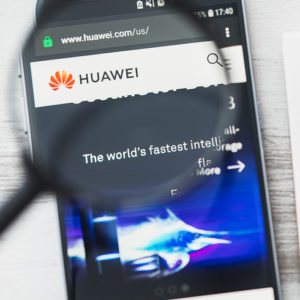Engineers, programmers, researchers and scientists often joke among themselves that they never lie, cheat or steal. Instead, they say they elaborate, collaborate and borrow.
There is a fundamental truth within this hopeful euphemistic shift. Collaboration is a critical element of successful invention and innovation. From Alexander Graham Bell, Thomas Watson and the telephone — to James Watson, Francis Crick and human DNA — engineers, researchers and scientists have always collaborated.
Unfortunately, the U.S. government is seeking to curtail Huawei’s collaborations with academic institutions and think tanks in the country.
Huawei has historically invested millions of dollars annually in such collaborations, which the company believes fuel basic research and transformative innovation. Experts agree curtailing such collaborations flies in the face of trends that have driven innovation and invention for hundreds of years.
Nicholas Negroponte joined the faculty of the Massachusetts Institute of Technology in 1966, founded that institution’s world-famous Media Lab in 1985 and launched the One Laptop Per Child initiative.
At a Huawei-hosted event in December 2019, Negroponte spoke about collaboration, innovation and secrecy. He chided the U.S. government for its treatment of Huawei and argued that the basic research that drives innovation is collaborative, open and “pre-competitive.”
Dr. Craig Brown is a technology industry expert and thought leader with more than three decades of industry experience and deep expertise in data analytics.
He has argued that open collaboration is more than a tradition among developers and inventors. It is also absolutely essential to achievement of a goal important to Huawei and others: digital inclusion.
Huawei believes access to secure connectivity is only a beginning step toward digital inclusion. Beyond technologies for connectivity and access, people need applications, services and tools that help them do things that matter to them, and the skills to use these.
At Huawei, we call this focus on technology, application and skills TECH4ALL. And all of our initiatives in this important area, including the examples below, rely on collaboration with multiple partners.
- We are partnering with digital medical device makers at DIVE Medical to develop a portable, non-invasive, AI-powered tool to ease and speed diagnosis of pediatric visual impairments. Some 19 million children in the world are visually impaired, and as many as 80 percent of those impairments are treatable — once diagnosed.
- In Bangladesh, Huawei and mobile network operator Robi Axiata have deployed six buses equipped with computers and internet access to train 50,000 women in digital skills since 2017. In Kenya Huawei is partnering with mobile network operator Safaricom and a Belgium-based nonprofit called Close the Gap to deliver DigiTruck. The vehicle is equipped with 20 laptops, internet access and two trainers, and brings digital skills training to youth in remote areas. Another DigiTruck is coming to Kenya soon as well.
- Huawei is also partnering with Rainforest Connection, a San Francisco-based nonprofit striving to protect rainforests around the world. The group uses upcycled Huawei phones and Huawei cloud-based artificial intelligence cloud technologies to listen for poachers, illegal loggers and endangered species — and to route responders appropriately. Rainforest Connection says deforestation generates more carbon emissions worldwide (17 percent) than all vehicles (13 percent). Each rainforest installation of a Huawei-based listening station therefore delivers benefits equivalent to taking hundreds of vehicles off the roads annually. And we’re working together to add features and intelligence that help track and protect endangered species.
The United States has a history of success through collaboration stretching back to the very founding of the country. Even recently, in the midst of political distractions and divisions, the U.S. announced new and improved collaborative trade agreements with Canada and Mexico.
At Huawei, we believe collaboration is fundamental to the success of our TECH4ALL initiatives, which intend to help people around the world to connect, not divide. Huawei is continuing and expanding its collaborations with think tanks, academic institutions, standards bodies and other organizations around the world.
Where collaboration with U.S. firms is concerned, Huawei has a question for the U.S. government: Why stop now?
Visit our TECH4ALL web site to learn more about how we collaborate to promote digital inclusion around the world, and how you can join our efforts.

